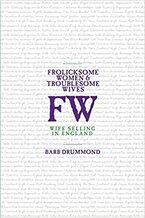
TITLE: Frolicksome Women & Troublesome Wives: Wife Selling in England
AUTHOR: Barb Drummond
PUBLISHER: Self published, 2018
ISBN: 9781912829071
PODCAST EPISODE: None
REVIEWER: Mark Norman
French visitors to England often claimed that any Englishman tired of his wife could sell her in a halter at Smithfield market. The press is littered with accounts of sales which varied in their form, the dates and places. Some sales were brutal affairs with the wife as victim. But others were initiated by women themselves. One bought herself, some set their own prices and there were celebratory meals and the ringing of bells.
The wife sale is in many ways a piece of forgotten social history in England. There is much evidence to be found as to their existence, and of the laws (or lack thereof) surrounding them, but little is generally known about the sales more widely and until now there has not been much of an attempt recently to bring the data together.
There are some historical writings on the subject; the antiquarian Sabine Baring-Gould for example wrote a chapter on wife sales in his book Devonshire Characters and Strange Events.
Historian and author Barb Drummond has done an admirable job in drawing together as much of the available information as possible, both from historical writings such as Baring-Gould’s and from press archives, and has gone a long way to tie all of this together with good analysis where evidence is available and sound conjecture where it is not.
Drummond is well practised in writing on quirky, niche historical subjects, with other titles on Henry Bridges’ machine The Microcosm and tobacco merchant Samuel Gist to her name. These kinds of subjects obviously suit her research style well as there is a wealth of material presented in Frolicksome Women. It is especially interesting to see through the evidence how many of the stories once ascribed as French propaganda were true, and where some elements of the wife sale have moved over and entered into the folklore record.
There are one or two places in the book where some repetition suggests that a little further editing might have been beneficial, but this should not detract from enjoying what is an extremely valuable collection of stories on a subject which has been forgotten, and perhaps should not have been.
AUTHOR: Barb Drummond
PUBLISHER: Self published, 2018
ISBN: 9781912829071
PODCAST EPISODE: None
REVIEWER: Mark Norman
French visitors to England often claimed that any Englishman tired of his wife could sell her in a halter at Smithfield market. The press is littered with accounts of sales which varied in their form, the dates and places. Some sales were brutal affairs with the wife as victim. But others were initiated by women themselves. One bought herself, some set their own prices and there were celebratory meals and the ringing of bells.
The wife sale is in many ways a piece of forgotten social history in England. There is much evidence to be found as to their existence, and of the laws (or lack thereof) surrounding them, but little is generally known about the sales more widely and until now there has not been much of an attempt recently to bring the data together.
There are some historical writings on the subject; the antiquarian Sabine Baring-Gould for example wrote a chapter on wife sales in his book Devonshire Characters and Strange Events.
Historian and author Barb Drummond has done an admirable job in drawing together as much of the available information as possible, both from historical writings such as Baring-Gould’s and from press archives, and has gone a long way to tie all of this together with good analysis where evidence is available and sound conjecture where it is not.
Drummond is well practised in writing on quirky, niche historical subjects, with other titles on Henry Bridges’ machine The Microcosm and tobacco merchant Samuel Gist to her name. These kinds of subjects obviously suit her research style well as there is a wealth of material presented in Frolicksome Women. It is especially interesting to see through the evidence how many of the stories once ascribed as French propaganda were true, and where some elements of the wife sale have moved over and entered into the folklore record.
There are one or two places in the book where some repetition suggests that a little further editing might have been beneficial, but this should not detract from enjoying what is an extremely valuable collection of stories on a subject which has been forgotten, and perhaps should not have been.